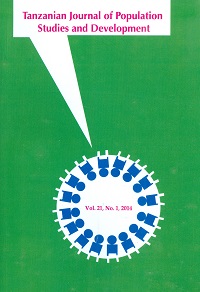Student ' s Understanding and Awareness Of Reproductive Health and their Future Fertility Prospects: Findings from University of Dar es Salaam
Abstract
This paper discusses student ' s understanding, awareness of reproductive health issues, and their future fertility prospect. It is based on the findings of a social survey conducted at the University of Dar es salaam in Tanzania. The purpose of the survey was to describe student ' s understanding, awareness of reproductive health, as well as their future fertility prospect. The study revealed that student ' s understanding of reproductive health is poor. Income poverty, culture, lack of awareness and misconceptions are among the factors which causes many reproductive health problems. Most of respondents (students) wish to get married, have a family and start their child-bearing at the age between 25-30 years. The analysis shows a slight difference between men and women as to when one wishes to start child-bearing. Men prefer to start childbearing soon after marriage, whereas women prefer to start childbearing a year after marriage. However, the majority do not prefer to have the same number of children as their parents had: the ideal number of children is 2. The findings suggest that unwanted pregnancy and abortion are among the major reproductive health problems confronting students. Abortion was noted to be a function of external pressure, particularly economic insecurity. Notable was the fact that abortion was perceived negatively, and that it should not be legalized. Thus, this paper generally concludes that student ' s poor understanding and awareness of some fundamental reproductive health issues is a reflection of poor accessibility to information and education on reproductive health. It recommends that there is a need to incorporate reproductive health education in secondary school and higher learning curricula in order to empower young people to overcome reproductive health problems caused by rapid social changes.
References
Aassve, A., & G. Altankhuyug. 2002. Changing Pattern of Mongalian Fertilty at a Time of Social and Economic Transition. Studies of Family Planning, Vol.33, No. 22: 165-172.
Caldwell J.C., & P. Caldwell. 1987. The Cultural Context of High Fertility in sub-Saharan Africa. Population and Development Review, Vol. 13, No. 3: 409-437.
Choe, K.M. & O.N. Tsuya. 1991. Why Do Chinese Women Practice Contraception? The Case of Rural Jilin Province. Studies in Family Planning, Vol. 22, No.1: 39-51.
DHS. 1999. Trends in Demographic Family Planning and Health Indicators in Tanzania, Bureau of Statistic and Planning Commission.
Family Care International, 1994. Action for the 21st Century Reproductive Health and Rights for All. International Conference on Population and Development.
Glove, K.E. 2003. Sexual Health Experiences of Adolencents in Three Ghanaian Town. International Family Planning Perspectives, Vol. 29, No. 1: 32-40.
Harrel-Bond, B. 1975. Some Influential Attitudes about Family Limitation and the use of Contraceptives among Professional Group in Sierra Leone. In J.
Caldwell, (ed.) Population Growth and Socioeconomic Change in West Africa. New York: Columbia University Press.
Maghimbi, S. 1996. Family Planning Practices and Attitudes in Tanzania: The Case of Artisanal Fishermen in Bagamoyo. Tanzania Journal of Population Studies and Development, Vol. 3, No. 1 and 2: 73-82.
Mbwizvo, T., & D.J. Adamchak. 1991. Family Planning Knowledge, Attitudes and Practices of Men in Zimbabwe. In Studies in Family Planning, Vol. 22, No.1.
Ngalinda, I. 1998 Age at First Birth, Fertility and Contraception in Tanzania. PhD thesis.
WHO & Guttmacher Institute, 2007. Facts on Induced Abortion Worldwide.
United Republic of Tanzania (URT). 2005. Tanzania Demographic and Health Survey. Dar es Salaam: National Bureau of Statistic & Ministry of Health and Social Welfare.
€”. 2005. Reproductive Health and Child Health Strategy 2005-2010, Dar es Salaam: Ministry of Health.
Weeks, R.J. 1996. Population: An Introduction to Concepts and Issues, London: Wadsworth.


